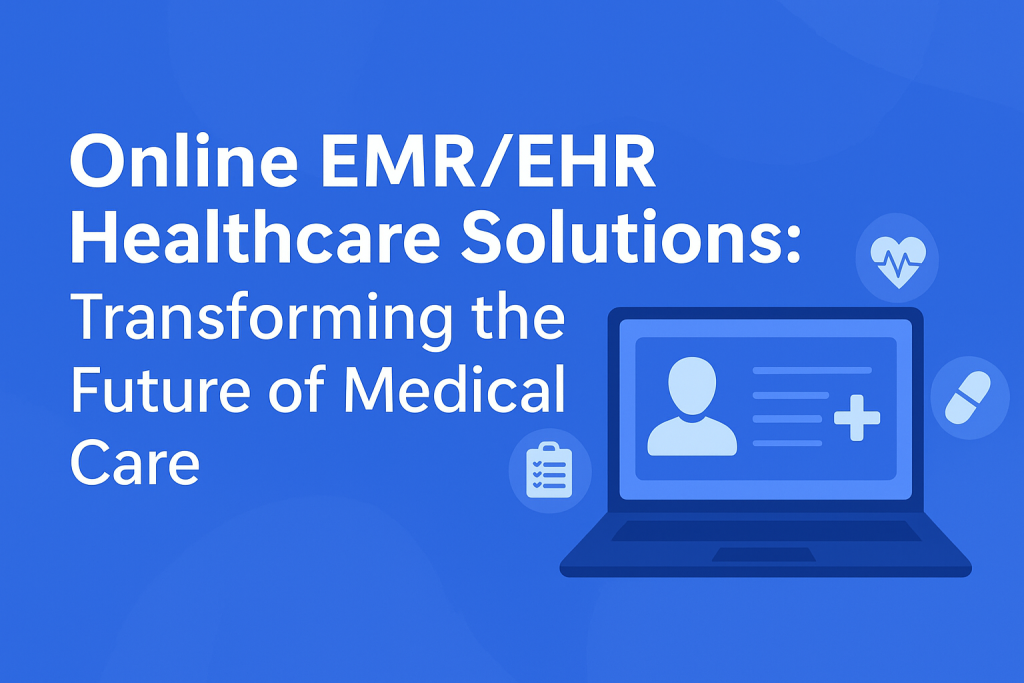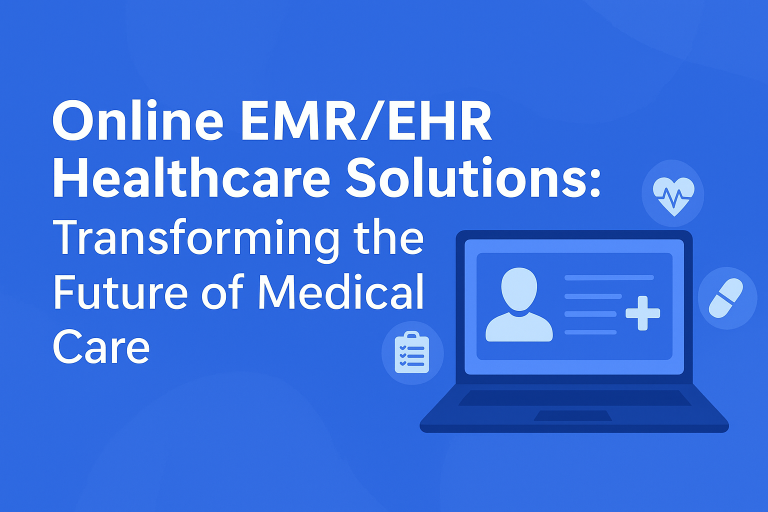In today’s digital era, the healthcare sector is evolving faster than ever. Online EMR/EHR Healthcare solutions are becoming the backbone of modern medical practices, ensuring that patients and doctors both benefit from seamless access to information. These solutions not only make healthcare more efficient but also improve patient care through organized data, accurate reporting, and instant communication. Moreover, the increasing adoption of digital systems highlights how hospitals and clinics are prioritizing innovation to meet patient needs effectively.
Understanding Online EMR/EHR Healthcare Solutions
Before diving deeper, it is important to understand what Online EMR/EHR Healthcare solutions mean. Whereas EHR stands for Electronic Health Records, EMR stands for Electronic Medical Records. At first glance, they may seem similar; however, there are significant differences. An EMR refers to digital versions of patient charts used mainly within a single practice, whereas an EHR is a more comprehensive record that can be shared across different healthcare providers and facilities.
Therefore, when healthcare providers adopt medical emr software or electronic medical records software, they are essentially replacing outdated paper-based systems with digital platforms. This shift not only minimizes human errors but also ensures that patient data is easily accessible whenever needed. Furthermore, online systems allow doctors, nurses, and administrators to collaborate more efficiently, leading to improved outcomes for patients.
Why Healthcare Needs Digital Transformation
The healthcare industry deals with massive amounts of data daily. From patient histories to lab reports and prescriptions, information flow is constant. Traditionally, handling this data manually was not only time-consuming but also prone to errors. Consequently, delays in treatment, missing reports, or miscommunication often caused serious challenges.
However, the rise of Online EMR/EHR Healthcare solutions has completely changed this scenario. With digital systems, hospitals can ensure accurate, real-time data access. Moreover, patients also benefit as they can view their records online, book appointments, and even consult doctors virtually. In addition, administrators can streamline billing, insurance, and reporting, which reduces the burden of paperwork.
Benefits of Medical EMR Software
One of the major reasons why clinics and hospitals are turning to medical emr software is its ability to enhance efficiency. For instance, doctors can instantly check previous diagnoses, allergies, and ongoing medications without flipping through physical files. Moreover, automated reminders for follow-up visits and vaccination schedules improve patient engagement.
Another key advantage is data security. Since most electronic medical records software comes with encryption and access controls, sensitive patient information is safeguarded. In addition, audit trails help maintain transparency and accountability, ensuring compliance with regulations.
Furthermore, the integration of medical EMR systems with diagnostic tools and labs provides quick access to reports. As a result, decision-making becomes faster, and treatment becomes more accurate.

EHR Software in India: A Growing Demand
The healthcare sector in India is undergoing rapid digitization. Interestingly, ehr software in india is gaining momentum due to government initiatives, private investments, and rising awareness among healthcare providers. For example, the Indian government has been promoting digital health records under the Ayushman Bharat Digital Mission, which encourages the adoption of EHR systems nationwide.
Moreover, private hospitals and clinics are realizing the importance of electronic health records in ensuring quality treatment. In addition, patients are increasingly expecting digital convenience, such as online consultations, medical record access, and e-prescriptions. Consequently, the demand for ehr software in india is growing not only in metropolitan cities but also in smaller towns.
Challenges in Implementation of EMR/EHR Healthcare Solutions
Despite the numerous benefits, implementing Online EMR/EHR Healthcare solutions comes with challenges. High costs, lack of awareness, and resistance to change are some of the common barriers. However, with proper training and government support, these obstacles can be overcome.
For instance, small clinics may hesitate to invest in electronic medical records software due to budget concerns. Nevertheless, many healthcare software companies now offer cost-effective and scalable solutions. Moreover, cloud-based platforms reduce infrastructure expenses, making it easier for even small healthcare providers to adopt these systems.
In addition, ensuring data privacy and compliance with regulations is crucial. Therefore, hospitals and clinics must choose trusted vendors who follow strict security standards.
The Role of Electronic Health Records
When we talk about the future of healthcare, electronic health records play a central role. Unlike EMRs that focus on individual clinics, EHRs are designed to share information across multiple facilities. For example, if a patient moves to a different city, their new doctor can easily access previous treatment records through an EHR system. Consequently, continuity of care improves significantly.
Moreover, EHRs allow integration with wearable devices, telemedicine apps, and remote monitoring systems. This makes healthcare more proactive, as doctors can track patient conditions in real time. In addition, analytics tools built into EHRs can identify patterns, helping in preventive care and disease management.
Future Trends in EMR/EHR Healthcare Solutions
The future of Online EMR/EHR Healthcare solutions looks promising. Artificial Intelligence (AI), Machine Learning (ML), and predictive analytics are being integrated into these systems. For instance, AI-powered tools can analyze patient history and suggest potential diagnoses. Furthermore, chatbots and virtual assistants are being added to improve patient interaction.
In addition, blockchain technology is being explored to enhance data security and interoperability. Consequently, healthcare providers can exchange information with confidence, without compromising patient privacy.
Moreover, the trend of cloud-based electronic medical records software ensures scalability and remote accessibility. This is particularly beneficial for rural healthcare centers that may not have advanced infrastructure.
Conclusion: EMR/EHR Healthcare Solutions
In conclusion, the adoption of Online EMR/EHR Healthcare solutions is no longer optional; it has become a necessity. With rising expectations from patients, healthcare providers must embrace digital systems to stay relevant. Moreover, using medical emr software and electronic medical records software ensures better efficiency, accuracy, and patient satisfaction.
Furthermore, the demand for ehr software in india reflects the growing need for digital healthcare across the nation. As more hospitals and clinics adopt electronic health records, the healthcare ecosystem will become more connected, transparent, and patient-centric.
Therefore, the future of healthcare is undoubtedly digital, and EMR/EHR solutions are leading this transformation. The sooner healthcare providers implement these systems, the more they will benefit from streamlined operations and improved patient outcomes.

